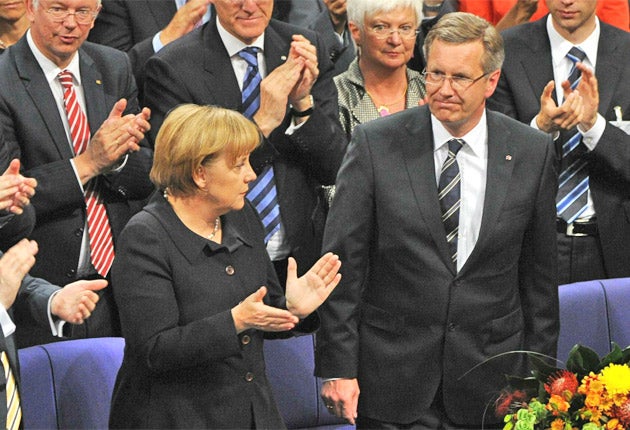Humiliation for Merkel as coalition stages revolt

Angela Merkel suffered a devastating blow to her authority as Chancellor yesterday after her candidate twice failed to win an absolute majority in Germany's key presidential election, casting grave doubt on the future of her ailing coalition government.
Christian Wulff, the unpopular conservative prime minister of the state of Lower Saxony, was chosen by Ms Merkel to run for the highest office in Germany in yesterday's election.
But he was forced into a humiliating third round after twice failing to get a mandate. In the event he scraped to victory with a comparatively slim majority late yesterday.
"This may be the beginning of the end of Merkel's coalition," said Der Spiegel magazine.
Politicians in Ms Merkel's own conservative party admitted that the result had backfired on the Chancellor: "I can't feel much of what was supposed to be the great unity of our coalition," said Wolfgang Bosbach, a senior conservative MP. "This was meant to be a symbol for a new start," he added. Mr Wulff, a 51-year-old career politician, will be sworn in as President tomorrow. "I want to work for greater unity among Germans, 20 years after our reunification," he said.
German presidents are elected by the country's Federal Assembly, a 1,244-seat body comprising parliamentary MPs and delegates from the country's 16 federal states. Mr Wulff, who joined Ms Merkel's party when he was a schoolboy, became only the third presidential candidate to fail to get elected by an absolute majority.
In the first round Mr Wulff was 23 votes short of his goal; in the second, he fell eight votes short. He won the third round by 625 to Mr Gauck's 494 votes. Ms Merkel described Mr Wulff yesterday as a president who would "talk about the things that are important to us not only abroad but also to people here in Germany."
However, Mr Wulff's failure to get elected in the first two rounds was damning evidence of a rebellion within Ms Merkel's governing Christian Democratic Party and her coalition with the liberal Free Democrats.
Horst Seehofer, who leads the Bavarian wing of Ms Merkel's conservatives, had earlier described the presidential election as a vote on "the fate" of the German government. Several commentators have predicted that a bad performance by the Chancellor's chosen candidate would be a devastating vote of no confidence in her government that would ultimately trigger fresh elections.
The presidential ballot was called three years early after Horst Köhler, a former International Monetary Fund chief, stepped down suddenly last month, ostensibly because of criticism of remarks he made about Germany's deployment in Afghanistan. In an interview he suggested the military presence was designed to safeguard the country's trade routes.
However, most observers said he had become an isolated figure who had lost touch with his conservative party supporters. Ms Merkel had hoped to redress the balance with Mr Wulff, a reliable conservative politician , and prove her government had regained the upper hand.
Mr Wulff's unconvincing performance adds to a growing list of political disasters for Chancellor Merkel. She enjoyed record popularity during her first term but has seen her popularity slump to from 80 to 50 per cent since being re-elected last September. During that time she has been hit by the eurozone crisis, with calls in some quarters for Germany to return to the deutschmark; her latest budget contains €80bn (£65bn) worth of highly unpopular spending cuts; her coalition has been bogged down by infighting over tax cuts and health reforms; and she has lost her majority in the upper house of parliament.
Join our commenting forum
Join thought-provoking conversations, follow other Independent readers and see their replies
Comments
Bookmark popover
Removed from bookmarks